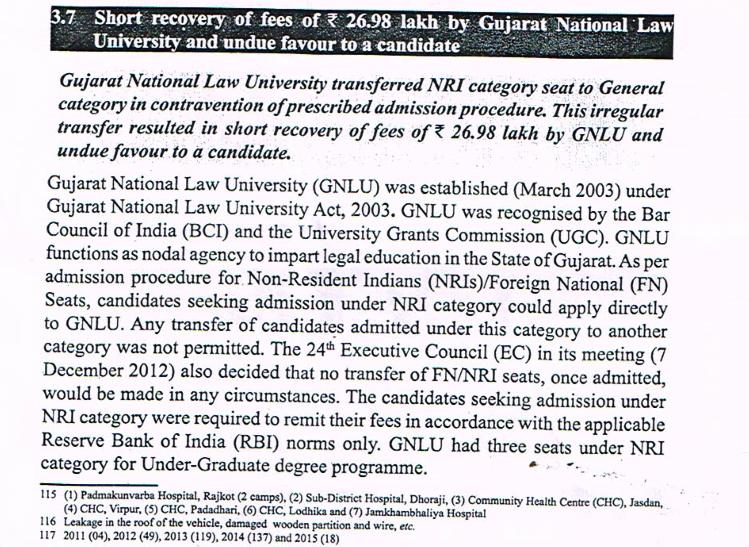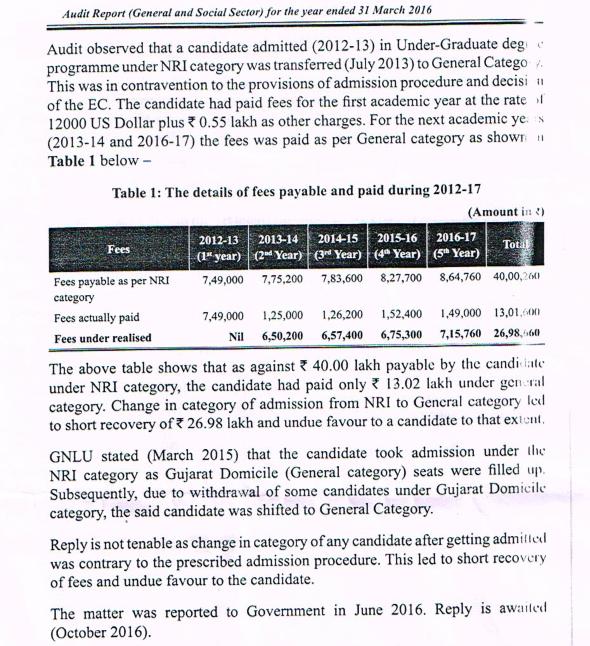
GNLU Gandhinagar showed undue favour to an LLB student of the law school, resulting in a loss of Rs 27 lakh to GNLU’s coffers, according to the annual Comptroller and Auditor General (CAG) report tabled before the Gujarat legislative assembly on 31 March 2017.
According to the CAG report, it was first reported to the government in June 2016 that GNLU had transferred a student it had admitted on a non-resident Indian (NRI) seat, which carries very high fees, to the general seat, despite an internal prohibition against such transfers:
Gujarat National Law University transferred NRI category seat to General category in contravention of prescribed admission procedure. This irregular transfer resulted in short recovery of fees of Rs 26.98 lakh by GNLU and undue favour to a candidate.
The fee for the NRI category was around Rs 7.5 lakh during the 2012-13 academic year when the student took admission to GNLU’s LLB batch. Next year, when the student was moved to the general category where the fee was Rs 1.25 lakh, the fee for the NRI category was increased to Rs 7.75 lakh.
In subsequent years, the NRI category fee was increased to Rs 7.83 lakh, Rs 8.27 lakh and Rs 8.65 lakh, while the general category fee remained under Rs 1.5 lakh.

By the time of graduating in 2017, the student would have paid GNLU more than Rs 40 lakh, but due to her transfer the total fee deposited by her was only a little more than Rs 13 lakh.
General category seats at GNLU are taken through the Common Law Admission Test (CLAT) ranking system, but candidates can apply to the NRI quota directly. A source in GNLU told us that candidates admitted under the NRI category usually barely score 60% marks overall, in their senior secondary school board exams. CLAT candidates on the other hand compete against at least a 98% probability of rejection from all NLUs, as per the latest trends.
The CAG report notes that GNLU’s executive council (EC) had already decided against allowing the transfer of any candidate from the NRI quota to a general category seat, in December 2012. GNLU’s administration transgressed against this EC decision in this case.
GNLU officially replied to the CAG that it had made the transfer against freshly created vacancies under state-based reservation. The CAG states in its report that this reply was not tenable, therefore the matter was placed before the government in June 2016. The CAG also added that the government was awaiting a reply from GNLU since October 2016.
GNLU director Bimal Patel and GNLU’s spokesperson and examination section officer Nisha Trivedi did not respond to requests for comment since this morning.
Patel was recently taken to the Gujarat high court by GNLU staff members for alleged irregularities in his appointment procedures, as well as attracted adverse remarks from the HC for running the university like an oligarchy that violates human rights. Subsequently, the former chief justice of India (CJI) TS Thakur set up a judicial inquiry to look into Patel’s appointment procedures.
While the high court has sent the case of the staff members back to GNLU’s general council, confirmed one of the petitioners, the CJI inquiry is in limbo, according to several sources we spoke to.
threads most popular
thread most upvoted
comment newest
first oldest
first
What is that Dr. Bimal Patel achieved because GNLU lost a whooping amount of 27 lacs.
Any thing against the Director is rubbish good theory
Improvement? Haha.. Lol
Pls visit the college then you realised the truth.
Detailed judgement is in favor of GNLU, which speaks in volume to criticizers of GNLU.
Go on GNLU, People will allege but carry on the good.
Because it's a scam for giving unqualified people employment Strictly against Article-14 of Constitution.
Have the guts to do it
can you please fix the link?
threads most popular
thread most upvoted
comment newest
first oldest
first